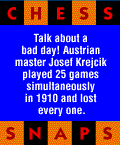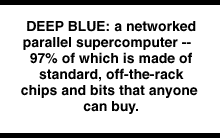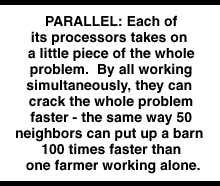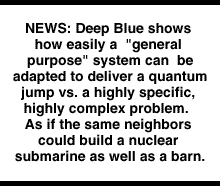


Imagine the possibilities of a Deep Blue/Kasparov collaboration! Multiply what only humans can do times what machines can do for them - and you will begin to get a sense of what this match is about. And why IBM researchers invested so much of their time and treasure in a device that does one thing well.
In 1989, when Kasparov played Deep Blue's predecessor, Kasparov won handily and IBM researchers went back to the lab. Deep Blue is the result, 1000 times faster than the earlier machine.

Kasparov may win again. But is he better he was in 1989? And how would he, or anyone, do against a computer that was many times more powerful than Deep Blue? The computer design that IBM is demonstrating here can grow in ability by orders of magnitude. Sooner or later, leaps like that will leave even a Kasparov in the rear-view mirror.
When that day comes, there will be a flurry of articles about "computers taking over," but they will miss the point. Computers have been defeating grand masters for years. When one finally knocks off the champ, almost nothing will change in the world of chess, but it will be good news for the rest of us.

We humans invented machines to do things we can't do ourselves. They're tools that make us stronger, move us faster, and even let us fly. As our bodies are the servant of our will, the tools we create are the servants of both. They enlarge us. No one who will tune in the Olympics this July cares that a car could easily outrun any competitor. Chess, like all human competition, will not be diminished by technology. Deep Blue is a computer that plays chess. It will never be a chess player.
Win or lose, Garry Kasparov will still be the champion. And Deep Blue will still be a terrific demonstration of how much more we can expect from the tools we call computers. Which is exactly what the IBM researchers set out to prove.
This machine itself won't change the world. (Deep Blue was only built for chess because chess is what researchers call a "clean" problem.) But its design will surely change a lot of things for a lot of people. Ten and hundred-fold leaps in what is possible can take scientists and businesses a very long way.
And in a networked world, one leap anywhere is a giant step everywhere. Not only can a system like Deep Blue distribute its capability to any number of people anywhere, it can learn from them and help them collaborate on solutions and learn from each other. In any community, "all of us are smarter than any of us," and the learning we take from the Deep Blue project can turbocharge the "all of us" part.
Imagine a Garry Kasparov/Deep Blue collaboration. Then imagine playing against Garry Kasparov + Deep Blue + all the other living grand masters on one team. (... Gulp!)

Now think beyond the chessboard. You don't have to be a Ph.D. to figure that 1000-fold leaps times X number of human collaborators times all their knowledge fed back into the loop is going to be a pretty big number. And that whatever you aim the whole works at is sure going to move. Problems that were insoluble yesterday can now be cracked like soft-boiled eggs. "Impossible" problems (like finding the missing mass in the universe or completing the map of human DNA) take longer, but as of now, the computing architecture and the networks exist to put huge dents in the very hardest problems that face us in Health, Science, and Enterprise.
The tools exist. We know how to build them. Where do you want to make some dents?
 Deep Blue up close and personal
Deep Blue up close and personal
 Charles Sheffield's Spin
Charles Sheffield's Spin
![]()
Powered by RS/6000 SP/2 (the same hardware that's under Deep Blue)
[ The Game | The Program | Commentary | Grandstand | Deep Blue ]
[ IBM home page | (C) | (TM) | IBM Small Planet Pavilion | Internet 1996 World Expo ]